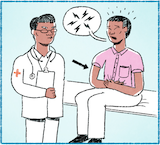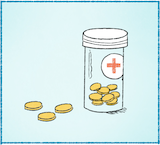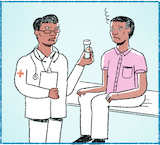




นี้คืออี่หยัง นี้คือหมอ อันนี้เป็นหมอ เป็นหมอลักสาคนป่วย หลือเป็นหมอลักสาทุกอย่าง
หมอกะมีหลายหน้าที่ สามาดเฮ็ดได้หลายอย่าง เฮ็ดได้หลายแบบ แล้วแต่หมอแต่ละคน
หมอบางคนกะลักสาตับ หมอบางคนกะลักสาไต แล้วแต่คน แล้วแต่หน้าที่ของหมอแต่ละคนออกไป
หมอบางคนกะเฮ็ดงานอยู่โลงพะยาบาน หมอบางคนกะเฮ็ดงานอยู่คิหนิก แล้วแต่คน แล้วแต่หมอ
หมอมีหน้าที่เฮ็ดหญังแน่ กะแล้วแต่หมอ แล้วแต่คนอีกหละ แล้วแต่หน้าที่ของหมอ หมอบางคนกะลักสาพุป่วย หลือหมอบางคนกะเฮ็ดสันยะกัมกะได้
17
หมอกำลังเฮ็ดหญังอยู่ เขากำลังเว้ากับพุป่วยอยู่ เขากำลังอะทิบายบางสิ่งบางอย่าง หลือเว้าบางสิ่งบางอย่างกับคนป่วยคนนี้
ตอนนี้คนป่วยกำลังนั่งอยู่แม่นบ่ แม่น ตอนนี้คนป่วยกำลังนั่งอยู่ กำลังนั่งอยู่กับหมอ กำลังนั่งเว้ากับหมออยู่ ตอนนี้หมอกำลังยืน หลืออะทิบาย หลือเว้าอี่หยังบางสิ่งบางอย่างให้คนป่วยนี้ฟัง
พุซายคนที่นั่งอยู่นี้บ่สะบายแม่นบ่ หลือบ่ซำบายแม่นบ่ แม่น พุซายคนนี้บ่ซำบาย เขากะเลยมาหาหมอ เพื่อที่สิให้หมอลักสาให้ เพื่อที่สิให้เขาซำบายขึ้น หลือมีอากานดีขึ้น
พุซายคนนี้เขาป่วยหลายบ่ บ่ซำบายคักบ่ กะบ่ฮู้คือกัน จักว่าเจ็บน้อยเจ็บหลาย อันนี้กะบ่ฮู้คือกัน ฮู้แต่ว่าเขากำลังเว้ากับหมอ หลือมาปึกสาหมออยู่ เขาอาดสิเป็นหลาย หลือบ่ซำบายคักกะได้
18
เขากำลังเฮ็ดหญังอยู่ คนป่วยคนนี้เขากำลังเว้ากับหมออยู่ เขากำลังเว้าให้หมอฟังว่าเขาเป็นอี่หยัง ว่าเขาเกิดอี่หยังขึ้นกับล้างกายของเขา
พุซายคนนี้ เขาเว้าอี่หยังกับหมอแน่ อันนี้กะบ่ฮู้คือกัน ฮู้แต่ว่าเขากำลังเว้ากับหมออยู่ อะทิบายโลกที่เขาเป็นให้หมอฟัง
เขาใซ้มือของเขาจับอยู่ท้องเขา เบิ่งแล้วเขาคือสิ[เจ็บ]ท้อง หลือเจ็บท้องคักกะด้อกะเดี้ยนี้หละ
พอหมอได้ญินแล้ว หมอสิเฮ็ดจั่งใด อันนี้กะบ่ฮู้คือกัน กะแล้วแต่หมอ จักหมอสิลักสาแบบใด อันนี้กะบ่ฮู้กับหมอคือกันเนาะ
19
นี้คืออี่หยัง นี้คือยา เป็นยาลักสาโลก จักยาลักสาโลกอี่หยัง
เห็นแต่เคี้ยงหมายของโลงพะยาบานอยู่ในก่องยาอันนี้ แล้วยาอันนี้กะเป็นเม็ดสีเหลียงๆ เม็ดเป็นวงกม เม็ดบ่ใหญ่หลาย เม็ดน้อยๆ หนึ่ง
ยาอันนี้ใซ้เฮ็ดจั่งใด ยาอันนี้กะเอาไว้กิน บางยากะเอาไว้ทา บางยากะเอาไว้เฮ็ดแบบอื่น แต่ยาอันนี้เป็นเม็ด เอาไว้ถ้ากิน กินเข้าไปในท้อง เอาใส่ปากของเฮา แล้วกะกินน้ำตามลงไป
20
หมอกำลังเฮ็ดหญัง หมอกำลังแนะนำยาให้คนป่วยคนนี้ กำลังสิเอายาให้เขากิน
เป็นหญังหมอคือเอายาให้เขากิน ยาอันนี้อาดสิเป็นยาที่ลักสาโลกที่เขาเป็นกะได้ อาดสิบันเทาลง หลือเฮ็ดให้อากานดีขึ้นกะได้
Link to overview page
Link to dictionary
| Isaan | Pronunciation | Tones | Thai | English/Notes |
|---|---|---|---|---|
| นี้ | ni: | HF | นี้ | 1. this 2. here |
| คือ | khʉ: | HR | คือ | 1. to be, to resemble, like, as 2. why {บักหล้าคือบ่เก็บโต่ะแน่ = [addressing a young boy] Why haven't you cleared the table?} |
| อี่หยัง | i:-yaŋ | H-M | อะไร | 1. what {นี้คืออี่หยัง = What is this?} {มื้อนี้เจ้าเฮ็ดอี่หยัง = What are you doing today?} {กินเข้างายกับอี่หยัง = What did you have for breakfast?} 2. something, anything, (in negations) nothing {บ่ต้องเฮ็ดอี่หยังอีกเลยนอกจากใส่ปุย = [we] don't need to do anything besides adding fertilizer} |
| หมอ | mɔ: | M | หมอ | 1. doctor, physician 2. guy, person |
| อัน | an | M | อัน | 1. thing, object 2. general clf. for objects |
| เป็น | pen | M | เป็น | 1. to be, to exist 2. to be able to 3. to suffer, sth. happens to 4. เป็นหญัง[...]คือ in initial position: why? {เป็นหญังเขากะคือแปงฟัน = Why is he brushing his teeth?} {เป็นหญังเคี่ยงบินมันคือสิตก = Why is the airplane falling down?} |
| ลักสา | lak-sa: | H-M | รักษา | 1. to cure, to heal, to take care of 2. to preserve, maintain, protect |
| คนป่วย | khon-pu:ai | HR-H | คนป่วย | patient, sick person Notes: see also พุป่วย |
| หลือ | lʉ: | M | หรือ | or |
| ทุก | thuk | H | ทุก | every Notes: also pronounced ทุ as in ทุมื้อๆ = everyday, always |
| อย่าง | ya:ŋ | H | อย่าง | type, kind, sort, category |
| กะ | ga | M | ก็ | 1. then, consequently 2. also |
| มี | mi: | HR | มี | 1. to have 2. there is |
| หลาย | la:i | M | เยอะ, มาก | many, much, very |
| หน้าที่ | na:-thi: | LF-H | หน้าที่ | duty, responsibility, obligation, function |
| สามาด | sa:-ma:t | M-HF | สามารถ | can, to be able |
| เฮ็ด | het | H | ทำ | to do, to make |
| ได้ | dai | HF | ได้ | 1. can 2. to get, to obtain 3. before verb: indicating past tense 4. บ่ได้ + verb: not |
| แบบ | bɛ:p | LF | แบบ | 1. example, model, kind 2. style, form, pattern, design |
| แล้วแต่ | lɛ:o-tɛ: | HF-H | แล้วแต่ | up to, depending on |
| แต่ละ | tɛ:-la | H-H | แต่ละ | each {มือแต่ละข้างกะสิมีห้านิ้ว = each hand has five fingers} {แต่ละมื้อๆ = each day} |
| คน | khon | HR | คน | person, people |
| บาง | ba:ŋ | M | บาง | 1. some {สัดบางโตบ่มีขา = some animals don't have legs} {บางคนสิมักกินกวยเตียวแทนเข้า = some people like to eat noodle soup instead of rice (dishes)} {บางสิ่งบางอย่าง = something, anything} 2. thin |
| ตับ | tap | M | ตับ | liver |
| ไต | tai | M | ไต | kidney |
| ของ | khɔ:ŋ | M | ของ | of, belonging to |
| ออก | ɔ:k | LF | ออก | 1. to go out, to leave 2. out |
| ไป | pai | M | ไป | 1. to go 2. auxiliary indicating action extending into the future |
| เฮ็ดงาน | het-ŋa:n | H-HR | ทำงาน | to work |
| อยู่ | yu: | H | อยู่ | 1. to be (located) at 2. yet, still 3. auxiliary indicating continuous or progressive action {ทอดปาอยู่ในกะทะ = (in the process of) frying a fish in the pan} {แม่กำลังเมี้ยนเฮียนอยู่ = mother is cleaning/tidying up the house} |
| โลงพะยาบาน | lo:ŋ-pha-ya:-ba:n | HR-H-M-M | โรงพยาบาล | hospital |
| คิหนิก | khi:-nik | H-M | คลินิก | clinic |
| หญัง | ɲaŋ | M | อะไร, เป็นหญัง = ทำไม | 1. what {เขากำลังเฮ็ดหญัง = What is he doing?} {ธูปเอาไว้เฮ็ดหญัง = What are incense sticks for?} 2. something, anything, (nothing) 3. เป็นหญัง[...]คือ in initial position: why {เป็นหญังเขาคือใส่บักพิกลงไปในกวยเตียว = Why is he putting chili in [his] noodle soup?} {เป็นหญังหน้าต่างมันคือเปิด = Why is the window open?} {เป็นหญังมันคือมีควนไฟ = Why is there smoke?} |
| แน่ | nɛ: | H | แน่, บ้าง | 1. some, somewhat 2. final particle, used to ask for examples (similar to Thai บ้าง at the end of a question) {หม้อใซ้เฮ็ดอี่หยังได้แน่ = What (different things) can a pot be used for?} {น้ำอัดลมซื้อได้อยู่ใสแน่ = Where/in which places can one buy soft drinks?} 3. final particle, when giving examples {มีเทิงส้งแน่ มีเสี้ยแน่ มีเกิบแน่ = there are trousers, shirts, shoes etc.} 4. final particle, used to give a command {ไปปิดหน้าต่างให้แน่ = Close the window!} 5. final particle, acting as an intensifier, especially in the pattern ... คัก ... แน่ {สูงคักสูงแน่ = very high} {ญ้องเฮาคัก ญ้องเฮาแน่ = [he's] praising me a lot} |
| อีก | i:k | LF | อีก | 1. more, again 2. other, another |
| หละ | la | M | แหละ, ล่ะ | 1. auxiliary for emphasis at the end of a phrase 2. auxiliary to create a follow-up question: And what about ... ? {แล้วลดคันที่สองหละ = And what about the second car?} |
| พุป่วย | phu-pu:ai | H-H | ผู้ป่วย | patient, sick person Notes: see also คนป่วย |
| สันยะกัม | san-ya-gam | M-M-M | ศัลยกรรม | surgery |
| กำลัง | gam-laŋ | M-HR | กำลัง | auxiliary indicating continuous or progressive action |
| เขา | khao | M | เขา | personal pronoun: he, she |
| เว้า | wao | HF | พูด | to say, to speak, to talk |
| กับ | gap | M | กับ | 1. and {ลุงกับป้า = uncle and aunt} {กวยเตียวหมูกับกวยเตียวไก่ = noodle soup with pork and noodle soup with chicken} 2. with, to {ค้ายๆ กับคำว่า ... = similar to the word ...} 3. prefix in front of foods {กับเข้า = side dishes eaten with rice} {เขากินกับกวยเตียว = he's eating noodle soup} |
| อะทิบาย | a-thi-ba:i | M-H-M | อธิบาย | to explain, to describe |
| บางสิ่งบางอย่าง | ba:ŋ-siŋ-ba:ŋ-ya:ŋ | M-H-M-H | บางสิ่งบางอย่าง | something, anything |
| ตอนนี้ | tɔ:n-ni: | M-HF | ตอนนี้ | now |
| นั่ง | naŋ | H | นั่ง | to sit |
| แม่นบ่ | mɛ:n-bɔ: | H-H | ใช่ไหม | question particle: ..., right? ..., isn't it? ..., don't you? etc. {เจ้าได้เห็นสิ่งนั้นแม่นบ่ = You've seen that, haven't you?} {ฝนกำลังตกแม่นบ่ = It's raining, isn't it?} {นี้คือกะคุแม่นบ่ = This is a bucket, isn't it?} |
| แม่น | mɛ:n | H | ใช่ | 1. yes 2. affirmative particle |
| ยืน | yʉ:n | M | ยืน | to stand |
| ให้ | hai | LF | ให้ | 1. to give {หมอกำลังเอายาให้คนป่วยกิน = the doctor is giving the patient medicine} 2. for 3. to allow, to be allowed |
| ฟัง | faŋ | HR | ฟัง | to listen, to hear |
| พุซาย | phu-sa:i | H-HR | ผู้ชาย | man, male |
| ที่ | thi: | H | ที่ | 1. that, which {คนที่ยืนอยู่ฝั่งขวา = the person which is standing on the right = the person standing on the right} {เว้าคำที่บ่สุพาบ = to speak words which are impolite = to speak impolitely} 2. for ordinal numbers {ที่สาม = third} |
| บ่ | bɔ: | H | ไม่ | 1. no, not 2. question particle, transforming a statement into a question Notes: spelling exception in line with common usage on social media |
| สะบาย | sa-ba:i | M-M | สบาย | to be well, to be healthy |
| ซำบาย | sam-ba:i | HR-M | สบาย | comfortable, feel good |
| เลย | lə:i | HR | เลย | 1. futher on, beyond, past {เข็มน้อยเลยเลขสิบสองไป = the minute hand has passed number twelve} 2. too much 3. at all 4. definitively 5. completely, utterly |
| มา | ma: | HR | มา | 1. to come 2. auxiliary expressing action towards the present or focal time {กะคุเฮ็ดมาจากอี่หยัง = What is the bucket made of?} {แล้วเขากะเก็บเงินจากพุนั้นมา = and then she takes the money of that person} |
| หา | ha: | M | หา | to look for, to find |
| เพื่อที่ | phʉ:a-thi: | H-H | เพื่อที่ | in order to, so that Notes: the vowel เอือ is likely to be a Thai loan |
| สิ | si | M | จะ | future tense auxiliary {เขากำลังสิตื่น = he's about to wake up} {สิไปตะหลาด = [I'm] going to the market} |
| ขึ้น | khʉn | LF | ขึ้น | 1. to go up, to increase 2. sun: to rise {ตะเว็นกำลังขึ้น = the sun is rising} 3. more 4. bus/train etc.: to get on, to board {พุโดยสานขึ้นลดไฟเบิดแล้ว = all passengers have boarded the train} |
| อากาน | a:-ga:n | M-M | อาการ | state, condition, symptom |
| ดี | di: | M | ดี | good |
| ป่วย | pu:ai | H | ป่วย | sick, ill |
| คัก | khak | H | intensifier: very, very much | |
| ฮู้ | hu: | HF | รู้ | 1. to know 2. to understand Notes: equivalent to ลู้ |
| คือกัน | khʉ:-gan | HR-M | เหมือนกัน | 1. also, likewise, similarly {ยินดีที่ได้ฮู้จักคือกันคับ = Nice to meet you too!} 2. in negative sentences: either {บ่ลู้คือกัน = I don't know either} {จักคือกัน = I don't know (either)} |
| จัก | jak | M | จัก | 1. answer to a question: [I] don't know, don't know exactly, [I'm] not sure {พุซายคนนี้เขาเถ้าไป่ จัก จักเถ้าหลือบ่เถ้า เบิ่งบ่ค่อยออก = Is this man here already old? I don't know. I can't see clearly whether he's old or not.} {เขาเว้ากันอยู่ใส จักคือกัน = Where are they talking? I don't know either.} 2. exact(ly), what exactly {จักต้มอี่หยังกะบ่ฮู้ = I don't know what (exactly) he is cooking} {บ่ลู้คือกันจักปาอี่หยัง = I don't know either what kind of fish this is} 3. how much/many? {ต้นไม้มีจักต้น = How many trees are there?} {ตอนนี้จักโมงแล้ว = What time is it now?} {มือของเฮานี้สิมีจักนิ้ว = How many fingers do our hands have?} 4. a bit, a little bit {จักหน่อย/จักหน่อยหนึ่ง = a bit, a little bit} |
| ว่า | wa: | H | ว่า | 1. that, as {คำว่า X = the word X} 2. to say |
| เจ็บ | jep | M | เจ็บ | painful, to hurt |
| น้อย | nɔ:i | HF | น้อย | 1. few, little 2. small |
| แต่ว่า | tɛ:-wa: | H-H | แต่ว่า | 1. but 2. only {ฮู้แต่ว่าเขายืนอยู่พุเดียว = I only know that he's standing there by himself} |
| ปึกสา | pʉk-sa: | M-M | ปรึกษา | to consult, to take/seek advice |
| อาด | a:t | LF | อาจ | 1. might, may, will 2. likely |
| เกิด | gə:t | LF | เกิด | 1. (often together with ขึ้น) to happen, to arise, to take place {เกิดอี่หยังขึ้น = what is happening?} {บ่มีหญังเกิดขึ้น = nothing's happening} 2. to be born 3. to grow {หนวดกะคือสิเกิดอยู่ใต้ดัง = a moustache grows below the nose} |
| ล้างกาย | la:ŋ-ga:i | HF-M | ร่างกาย | body |
| โลก | lo:k | HF | โรค | disease, illness |
| ใซ้ | sai | HF | ใช้ | to use |
| มือ | mʉ: | HR | มือ | 1. hand 2. front leg/paw (e.g., of a cat) |
| จับ | jap | M | จับ | 1. to grasp, to hold {เขาจับมือกัน = they're holding hands} {เขายืนจับไอติมอยู่ = she's standing, holding an ice cream} 2. to catch, to arrest {จับพุล้าย = to arrest a criminal} |
| ท้อง | thɔ:ŋ | HF | ท้อง | stomach |
| เบิ่ง | bəŋ | H | ดู | 1. to look at, to see, to watch {เบิ่งโทละทัด = to watch TV} {เบิ่งหนัง = to watch a movie} 2. to guess {เบิ่งซงแล้ว ... = [I] guess / from what it looks like ...} |
| แล้ว | lɛ:o | HF | แล้ว | 1. finished 2. already 3. and then, and next (especially แล้วกะ) 4. auxiliary for past tense |
| กะด้อกะเดี้ย | ga-dɔ:k-ga-di:a | M-HF-M-HF | มากมาย, มากเกินไป | intensifier: very, very much |
| นี้หละ | ni:-la | HF-M | นี่แหละ | auxiliary for emphasis at the end of a phrase |
| พอ | phɔ: | HR | พอ | 1. just when, just after, as soon as 2. enough, adequate |
| ได้ญิน | dai-ɲin | HF-HR | ได้ยิน | to hear |
| จั่งใด | jaŋ-dai | H-M | ยังไง, แบบไหน | how, in what manner {บักนาวมันมีลดซาดจั่งใด = Lime fruits have what kind of taste?} {เขาปิดแอจั่งใด = How is he switching off the A/C?} {เทียนใซ้จั่งใด = How's a candle used?} {สิใซ้จั่งใด = how is [it] used?} |
| ใด | dai | M | ใด | 1. which, that one which, what, how {เขานั่งแบบใด เขานั่งขดตะหมาดอยู่ = How is he sitting? He's sitting cross-legged.} {ตอนใด = when?} 2. whichever, whoever {หม้องใดหม้องหนึ่ง = some place, somewhere} {ขั้นเฮาอยากตื่นญามใด เฮากะตั้งเวลาปุกญามนั้น = If we want to get up at a certain time, we set the alarm to that time} Notes: sentence-final often with a marked rising tone |
| เนาะ | nɔ | H | เนาะ | final particle: makes the statement softer, looking for agreement |
| ยา | ya: | M | ยา | 1. medicine 2. drug |
| เห็น | hen | M | เห็น | to see |
| แต่ | tɛ: | H | แต่ | 1. but {แต่บ่ต่างกันหลาย = but not very different} {แต่บ่ลู้ว่าเขาญ่างมาแต่ใส = but [I] don't know where he's coming from, see also: แต่ว่า} 2. only {ตอนนี้มีแต่ขี้ฝ้า = now there are only clouds} |
| เคี้ยงหมาย | khi:aŋ-ma:i | HF-M | เครื่องหมาย | symbol Notes: pronunciation: also realized as เคื้องหมาย |
| ใน | nai | HR | ใน | in, within |
| ก่อง | gɔŋ | H | กล่อง | box, case, package |
| เม็ด | met | H | เม็ด | 1. seed, stone, kernel, grain 2. raindrop {เม็ดฝน = raindrop} 3. clf. for buttons {กะดุมเม็ดนี้ = this button} |
| สี | si: | M | สี | 1. color 2. colored pencil, crayon |
| เหลียง | li:aŋ | M | เหลือง | yellow |
| วงกม | woŋ-gom | HR-M | วงกลม | 1. circle, ring, sphere 2. round |
| ใหญ่ | ɲai | H | ใหญ่ | large, big |
| หนึ่ง | nʉŋ | H | หนึ่ง | 1. one 2. after adjective: intensifier {บักคักหนึ่ง = very much} {อันบักใหญ่หนึ่ง = very large}, or attenuates the meaning {กะดาดมันแผ่นน้อยๆ หนึ่ง = the piece of paper is [relatively] small} |
| เอา | ao | M | เอา | to take, to give {เขากำลังเอาก่องไปซั่ง = he's taking the boxes to weigh them} {หมอกำลังเอายาให้คนป่วยกิน = the doctor is giving medicine to the patient} {เอาไว้ถ้า = is for, is used for, has the purpose of} |
| ไว้ | wai | HF | ไว้ | 1. to keep, to put, to place, to retain, to save, to reserve {เขาเอาหัวของเขาไว้ใส = Where does she put her head?} {หมาสิเลี้ยงไว้บ้าน = dogs are kept/raised in the house} {ไก่เลี้ยงไว้ในคอก = chicken are kept/raised in a coop} {หน้ามันบังไว้ = the face is covered/not visible} {เขาเอาโทละสับวางไว้หู = he holds the phone to his ear} 2. for {นาลิกาปุกมีไว้เฮ็ดหญัง = What is an alarm clock for?} {หม้อเอาไว้เฮ็ดแนวกิน = a pot is used to make food} {ก่องเอาไว้เฮ็ดหญัง ก่องเอาไว้ใส่ของ = What is the box for? It's for putting in stuff.} Notes: see also ไว้ถ้า |
| กิน | gin | M | กิน | to eat, to consume, to use |
| ทา | tha: | HR | ทา | to apply, to put on |
| อื่น | ʉ:n | H | อื่น | other |
| ไว้ถ้า | wai-tha: | HF-LF | usually in a positive statement or answer: is for, is used for, has the purpose of {กะทะมีไว้ถ้าทอด = a pan is for frying} {น้ำบักนาวมีไว้ถ้าปุงอาหาน = lime juice is used to season food} {ปากกามีไว้ถ้าเขียน = a pen is for writing} {กะเทียมเอาไว้ถ้าเฮ็ดแนวกิน = garlic is used to make food} {ขาเอาไว้ถ้าญ่าง = legs are for walking} {เกิบเอาไว้ถ้าใส่ = shoes are for wearing} Notes: see also ไว้ |
|
| เข้า | khao | LF | เข้า | to enter, to go inside, to come/go in/on {เข้าห้องน้ำ = to go to the bathroom} {เข้านอน = to go to bed} {ขี่เลียเข้าไปเกาะ = to take a boat to go on an island} |
| ใส่ | sai | H | ใส่ | 1. to put something in/on {เขาใส่บักพิกในกวยเตียวหลาย = he's putting a lot of chili in his noodle soup} {เขาบีบยาสีฟันใส่แปงสีฟัน = he squeezes toothpaste on the toothbrush} {ก่องเอาไว้ใส่ของ = boxes are there to put stuff in} 2. to wear (clothes) {เขาใส่เสี้ยแขนญาว = he's wearing a long-sleeve} 3. directed at {เอิ้นใส่กัน = to call each other/to say to each other} {หมามันเห่าใส่แมว = the dog barks at the cat} {ล้องเพงใส่ไม = to sing into the microphone} {เขากำลังซี้มือไปใส่พุซาย = she's pointing at the man} |
| ปาก | pa:k | LF | ปาก | mouth |
| เฮา | hao | HR | เรา | 1. personal pronoun: we 2. personal pronoun: I |
| น้ำ | na:m | HF | น้ำ | 1. water 2. drink, soft drink, juice |
| ตาม | ta:m | M | ตาม | 1. according to 2. to follow, to go/come after |
| ลง | loŋ | HR | ลง | 1. to descend, to lower, to go down 2. down 3. bus/train etc.: to get off, to disembark {คนกำลังลงลดบั่ด = people are getting off the bus} 4. boat/ship etc.: to get on, to board {เขากำลังญ่างลงเลีย = he's boarding/getting on the boat} |
| แนะนำ | nɛ-nam | H-HR | แนะนำ | 1. to introduce {แนะนำโต = to introduce oneself} 2. to recommend, to suggest, to advise |
| บันเทา | ban-thao | M-HR | บรรเทา | to relieve, to alleviate, to ease |